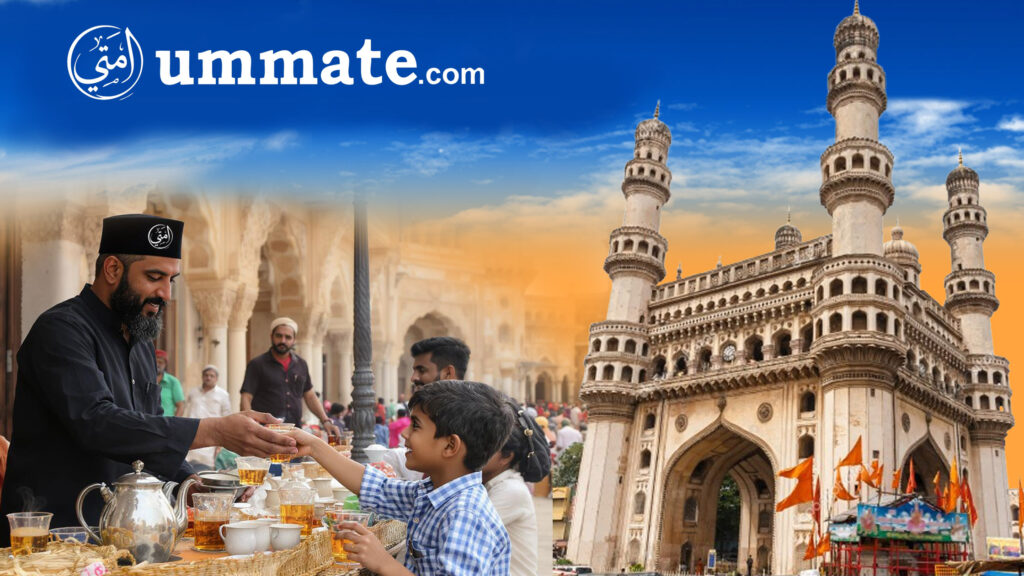
A Muslim Man wearing Black Cotton Cap selling Tea Vendor nearby Charminar in Hydrabad.
Every morning, as the azaan fades into the early hustle of Charminar, Hyderabad, Abdul Malik flips open the rusted shutter of his tiny chai stall. The pot is set. The milk boils. And as routine as muscle memory, he reaches for a black cap.
It’s plain — soft cotton, snug fit, embroidered in neat white Urdu: “Ummate.”
No glitter. No branding. No hashtags.
Yet somehow, that cap says everything.
At first, no one really noticed. Charminar is full of sights and noise. Vendors chant. Autos honk. Pigeons flap above the old minarets. In a place where a hundred things scream for attention, a simple cap is quiet.
But still, eyes began to catch it.
One old man nodded. A young boy smiled. A delivery guy whispered, “Zabardast hai bhai.” Tiny reactions. Silent acknowledgments. No one made a scene.
Until one evening, a tourist leaned against Abdul Malik’s stall. The smell of chai, the glow of golden hour, and the steady clink of steel cups set the mood.
The traveler pointed at his cap.
“Ummate? What’s that?”
Malik smiled.
“Bas ek yaad hai… ke hum akelay nahi hain.”
Just a reminder… that we are not alone.
The man didn’t say much after that. But he ordered three more cups.
That day, Malik sold forty more than usual. And not because of the tea. Because of the talk.
Observation
In today’s India, Muslim visibility often comes with hesitation. Many silently shrink — avoiding “too much Urdu,” hiding religious names, downplaying identity markers in public.
But unity isn’t about being loud. It’s about being present.
One cap, one phrase, one moment of recognition — it creates a spark.
Symbols are subtle, but they are powerful. They don’t have to provoke to be profound. A tote with a Qur’anic phrase. A sticker on a rickshaw. A word on a cap. These are not trends. They are truths worn lightly — and they invite connection.
Caps with Meaning.
What if your headwear wasn’t just for sun protection or style — but a signal of belonging?
Ummate’s identity caps are stitched with intention. Minimal design, dignified fonts, and Urdu lettering that honors our linguistic and spiritual heritage. No slogans. Just soul.
It’s da’wah without confrontation. Representation without apology. And it opens doors to dialogue — not debate.
Totes with Qur’anic Echoes.
A simple canvas tote that says “Sabrun Jameel” (Beautiful Patience) or “Wahdahu la sharika lahu” (He Alone, No Partner) — not to preach, but to remind. Whether at a university library or vegetable market, these bags speak softly of who we are and what we hold dear.
They’re not accessories. They’re reflections.
Stickers for Bikes, Bottles, and Rickshaws.
The back of a scooter. A thermos at work. The side of an autorickshaw.
Add a sticker that says “Ummat Zinda Hai” or “Salaam Begins with Me.” These little visuals can whisper identity into the busiest places. They catch the eye. They plant a thought. They say, “We’re here. Still standing. Still smiling.”
And in an age of division, these symbols carry barakah — the quiet blessings of visible faith.
Call to Action :
Abdul Malik didn’t start a movement. He just wore a cap.
But seven people asked about it. One shared tea. Another returned with his son. And a small chai stall near Charminar became more than a shop — it became a reminder.
That’s what Ummate stands for.
Small actions. Big heart. Quiet impact.
👉 Shop Ummate’s Accessories — each piece made to reflect faith, not fade into fear.
👉 Share your “Where I wore Ummate” story — was it at school? On a train? During a walk?
👉 Tag @ummate_lifestyle with #UmmatKiAwaaz — let your symbol spark someone’s strength.
👉 Call us : +91 7439 115 117
We’re not invisible. We’re not alone.
We are Ummate.
